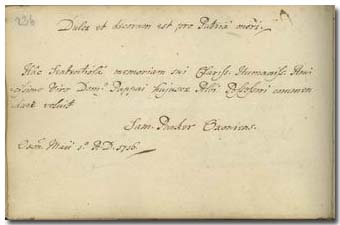
Dulce et decorum est pro Patriâ mori. *
Hâc Sententiolâ memoriam sui Clariss[imo] Humaniss[imo] Amicissimo
Viro Dom[in]o Pappai hujusce Albi Possessori commendare voluit
Sam[uel] Parker Oxoniens.
Oxon[iis] Maii 1º A. D. 1716.
|
* Horace, Carmina 3.2.13.
|
|
|
Sweet and glorious is to die for the fatherland. *
With this short saying I want to recommend
myself into the memory of my illustrious and erudite friend, Mr.
Pápai, the owner of this album
Samuel Parker of Oxford
In Oxford, on May 1, 1716
|
p. 236. Oxford, May 12, 1716
Parker, Samuel
(1681-1730), English theological
writer
Samuel Parker was born in 1681 in Chartam (Kent), second son of
the pastor Samuel Parker (1640-1688). His father was chaplain of
the Archbishop of Canterbury, from 1686 Bishop of Oxford, and
president of Magdalen College in Oxford, a devout partisan of
the Catholic James II (1685-1688). The young Samuel immatriculated
in 1694 at Trinity College of Oxford. Faithfully to the
paternal tradition, he did not take the oaths of allegiance required
after the “glorious revolution” (1688), but retired in Oxford and
dedicated himself to writing. A
work of him is also preserved in our Library. He published
philosophical essays, occasional writings and letters. He was a
very erudite, but modest and pious personality, appreciated by his
nonjuror theologian friends. In 1705 he was reported of wanting to
found an academy in Oxford for propagating Jacobite ideas. Finally
in May of 1711 he also took the oath, but in the meantime much had
changed in the circles of nonjurors, and England was ruled by Anne
Stuart (1702-1714), daughter of James II, sister-in-law of William
III. Parker died in Oxford on July 14, 1730, either in hydropsy or
in over-exertion. His younger son Robert founded the well known
publisher of Oxford whose later owners include the architecture
criticist John Henry Parker (1806-1884). The most important
cultural act of Samuel Parker was the foundation of the monthly
review
Censura temporum, or the good or ill tendencies of books, sermons,
pamphlets … of London, edited by him from January 1708 until
March 1710. He discussed the views of William Whiston
(1667-1752) and John Locke (1632-1704), for example in the
question of resurrection. His own views will be later echoed by
19th-century Tractarians. Some of his works are: Bibliotheca Biblica, being a commentary
upon all the books of the Old and New Testament. Gather'd out
of the … writings of fathers and ecclesiastical historians …
(the Pentateuch only). Oxford, 1720-35. 5 vol. – The history of
the works of the learned. London, 1699-1712. – The
ecclesiastical histories of Eusebius, Socrates, Sozomen and
Theodorit. Faithfully translated and abridged … With a
letter to Mr. Bolde concerning the resurrection of the same body.
London, 1720. 3 vol.
•
DNB • Jöcher-Adelung |

